 Fallen Leaves
Fallen Leaves Fallen Leaves
Fallen Leaves
Fallen leaves are not gone with the water;
The forgotten age - who comes to trace the song of wagon.
they simply fall and blend in with the soil to protect the flowers
Originally published on 1990-01-11, Independent News.
Revised for multimedia on 1994-07-07
Translator: Chiyang Chen
Chapter 1 Circus Singer (1)
Chapter 2 Circus Singer (2)
Chapter 3 The hermit by Great River (1)
Chapter 4 The hermit by Great River (2)
Chapter 5 The witches of Rhine and evening fragrance (1)
Chapter 6 The witches of Rhine and evening fragrance (2)
Chapter 7 The witches of Rhine and evening fragrance (3)
Chapter 8 The witches of Rhine and evening fragrance (4)
Chapter 9 Those Blank Years (1)
Chapter10 Those Blank Years (2)
Chapter11 The games of taboo (1)
Chapter12 The games of taboo (2)
Chapter13 Who comes to trace the song of wagon (1)
Chapter14 Who comes to trace the song of wagon (2)
This website is sponsored
by VIKON Corp.
Copyright July 1996.
All rights reserved.
Last update : 1999-11-01
Any Subjection? ? Mail to:
 �@
vikontony@gmail.com
�@
vikontony@gmail.com
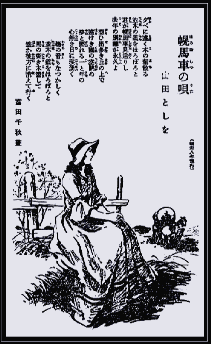
The first time I heard the song of wagon should be 1958. That year, father spent what he had saved up for several years intending to purchase a tailored made suit, on a tube radio with a turntable.
It was a deep autumn night, while my whole family was listening to the records, We heard a voice singing along with the music. Out of curiosity, I pushed open the window only to see a middle-age woman leaning on the wall singing. Realizing suddenly that people were watching, she looked embarrassed.
Mom knew that she sold meat in the market. Therefore she invited her to come in. Obasan (Mid-aged woman) said, she passed by our house, heard the familiar music, she could not help but sing along.
It turned out that she was the principal singer of a circus. After Taiwan's restoration To Republic of China, her circus dissolved, and she also got married. Her husband was a butcher who sold meat; therefor she worked in the market.
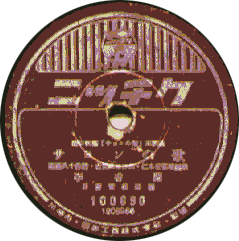
Mom chatted with her while I asked her to sing.. From then on she would come to our house occasionally. Sometimes she would be silent, totally immersed in music; sometimes she would sing along.
I remembered that she had a rare technique. She could imitate male voice and sang Gon Ban Wu Thang's song "The little second son of the flower" As for songs like " the song of wagon "," the song of peregrines", "Maria Maria " "Maid of the red house" she sang them with professional skills. I was about my teens; I could very well feel for that kind of love for music, totally involved and forgetful for self.
Not long after, gramophone became more popular, Obasan's visit to our house reduced.
This musical journey finally stopped.
The owner of the gramophone kept a small store. He sold daily appliances and listen to music during his leisure time. There was a wooden shelf that kept records. From those well-made registers mark, one could see they were mostly Columbia records and Victor - that has a squatting dog in it. Besides classical music, there were Spanish Tango, Japanese classics and popular music. There seemed to be quite a bit of them.
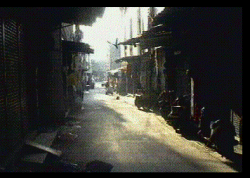
I wondered, why a person like that would keep a store for a living. It was late, and we knew each other only briefly, I did not dare to ask. After we parted, we did not contact each other. But that old man's musical culture and fine conversation left an indelible mark in me.
About three or four years ago, I visited the same place wanting to look for this old friend. However, situations have changed, I couldn't find him.
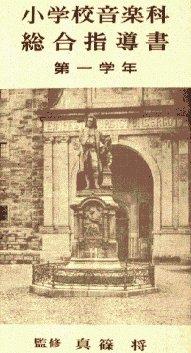
In the movie "Mournful City" there was a scene Wu Ching and Kuo Mei listened to The Loreley , that scene was very touching. In my memory, friends and relatives of my father's generation all liked to sing. They sang not only popular music ,but also world-famous pieces. Some of the prewar urban grade school graduates' appreciation to music may embarrass today's college grads. (foot note 1)
Foot note 1.
Classical music, operas and theaters were among those of elemtary school musical education.
Three years' of middle school covered a wider background of voice and instrumental music.
Please consult the nine volumes' of (elementary and secondary school musical instructions)
published by Japan Whole Sound music publication company. 1960-1962
More than one hundred Japanese musical educators wrote together. Most of the writers began
musical education about 1928; those who were later began to teach also about 1940.
According to the time frame, these people should be contemporary of those who taught in Taiwan.
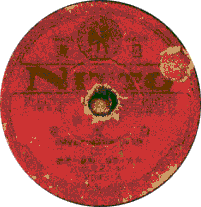
More than ten years ago, I worked in an organization. A coworker who knew some piano mentioned while chatting with his girl friend that Taiwanese did not know how to appreciate music. They knew only their native musicals'. I was hot-tempered then so I retorted with insults.
Actually those Taiwanese musicals were not bad. It was only that my mother often sang world-famous pieces and I also knew the origin of the witches of Rhine. So I mentioned this 'famous music' although I did not make him crestfallen, I earned some respect for Taiwanese.
1983 summer, I did some fieldwork for the sake of researching on Taiwanese living background during Japanese occupation. According to my sources prewar Japanese pushed forward Imperalizatoion, although intending to belittle Taiwanese songs, but they did not prohibit nor smear Taiwanese music. Early restoration period Taiwanese could still speak and sing very beautiful Taiwanese And folk songs.
(Back ground music: musical - White Tiger Hall (Moon Gui In) Lyrics by Chen Yu An , and music by Chen Chu Lin) (Sang by Yun Chi, Chei Mei, Ah In, Chui Lun, published by Eastern Sun Company.)

Early Taiwanese musical creators like Chen Da Ruo, Teng Yu Xian Chen Chu Lin, Chen Gen Yu, Chine An have all been made into records, and published widely. (Footnote2) Some Taiwanese famous songs were translated into Japanese (footnote 3)
Footnote2 White Tiger Hall (Moon Gui in) lyrics by Chen Yu An, Music by Chen Chu Lin. Published by Eastern Sun Company The sigh of Fon Jiao : Lyrics by Chen Da Ruo, music by literature department, Published by Victor company. The Wind of Love: Lyrics by Chen Gen Yu, music by Wang Fo Thei, Published by Victor Company Evening Fragrance: Lyrics by Chen Da Ruo, music by Chen Chu Lin Published by Victor Company
(Footnote 3) Su Yang Bei translated Teng Yu Xian's works �uFlowers in rainy night�v, �uSorrow of moonlit night�vinto Japanese. Matched with Japanese lyrics, it was published by Japanese company Columbia. After restoration , �u Sorrow of moonlit night�voriginally lyric by Chuo Teng Wang ,music by Teng Yu Xian , sang by famous Wen Xian was made into 78-tracks record, published by Asia Company , it was in vogue for some time. (Background music: Evening Fragrance: Lyrics by Chen Da Ruo Music by Chen Chu Lin)
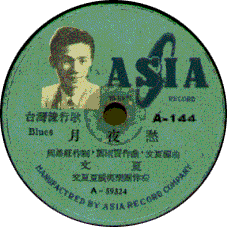
From antique records, evidences showed Taiwanese people during colonization period could sing world-famous music, could listen to native operas and created many Taiwanese singers.
If music was a phenomenon of culture, then it must reflect its time; its content must be richer than we can imagine. These folk songs survived world war ruins, and are still well-known today. At their time, they must be very famous. But, since when, Taiwanese dialect became a yellow plate that hanged over a Jewish chest. Taiwanese folk songs became synonym to low class pleasures. The intellectuals looked down upon and rejected them. Middle class peoples nor would deign to listen. Only those salesmen and footmen would sing during their leisure time after working in the market. The decline of native folk songs is a sign for Taiwanese Destiny.
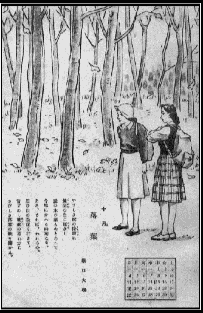
Contemporary , both reading �u Can I have your name?�v �uThe Condition for humanity�v, how did Japanese differ from Taiwanese? How their hearts feel different? Compare with same-age Taiwanese people, those Japanese Readers who were sent back to Japan could be much more fortunate.
I have interviewed with several elderly women born about 1920's. They uncovered long dust-sealed memory and spoke of their childhood. They still remembered the outing trip during late autumn: that they sang all along the way and trod on fallen leaves. Although it was of bygone time, their memory was still very colorful.
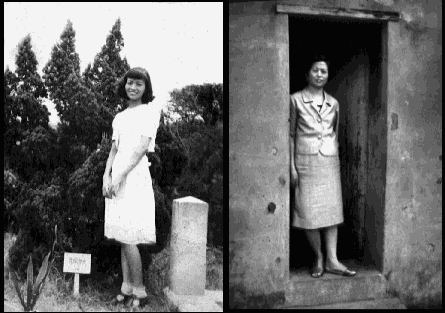
Looking at them, I remembered the old hermit by Great River. his image came to my mind. Suddenly, I realized my mother has not sung a song for a long time. I can not help asking myself �uAre their smiles ended with childhood and gradually disappear during their suffering? Or the unjust ruler shut them up coldly ?�v
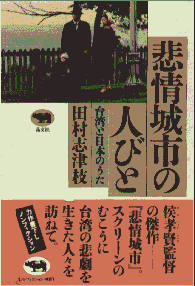
Between ignorance and identification there need not be too many bridges. "Mournful City" the arguments about its history and Ten Cun 's confusing should be of great sorrow for Taiwanese intellectuals.
Before Marshall Rule Regime was over, all research about the event of 228 were one-sided. They were biased to be articles that spoke of causality, very few touched the layer of culture. Observed from the surface, it was the media. At that time media was not as well spread, any information would be hard to get to. The truth should be the government, who put a ban on media.
After Marshall Rule, freedom of speech gradually became available. But it still could not polish history with truths. Instead, types of consciousness came out in conflict to one another, and the more complicated state and business world pushed a "gluing" process. The work of "packaging history "moved from behind the stage to platform.
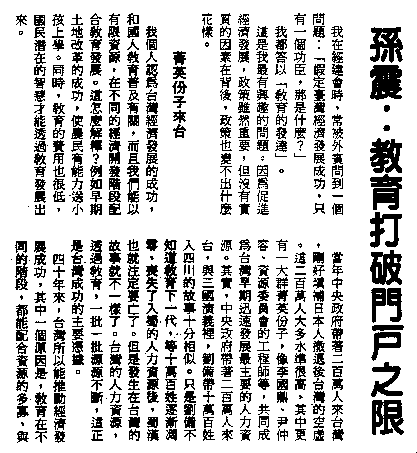
Flowers of Taiwan, those, who have been through the ruins of the war, were captured and killed during the event of 228 and subsequent political purges during the fifties. Mainlander, that is the truth, was "just rightly" filled in this vacuum. But among the two millions of Mainlander who came to Taiwan, many dropped out of school because of the war, or they were little-schooled soldiers. There were also many young students about Dr. Sun 's age. To say that they were all of very high standard is hard to accept.
The younger generation should not pay attention to event of 228 in itself�F they should pay attention to the forty years of ban on freedom of thought, its conflict and impact on native humanity, and on the society. If Teng Cun's research can pay attention to this point, he could discover a face of Taiwanese culture that was often neglected. (Source of photos and data: Under the Heaven magazine, No. 81p.69. February 1988)

They worked hard toiled way, their result is called a "Miracle" today, but the pilgrimage of their heart very few knew about. While the eyewitnesses of history gradually died away, is it fair to package them in a movie like The Sad City

Where is Godo? When will Taiwanese struggle free their nightmares, and do not leave blank to their ages.